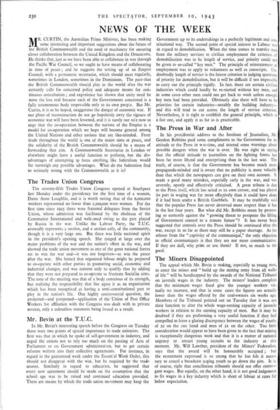Mr. Bevin at the T.U.C.
In Mr. Bevin's interesting speech before the Congress on Tuesday there were two points of special importance to trade unionists. The first was that in which he spoke of self-government in industry, and urged the unions not to rely too much on the passing of Acts of Parliament or on Government administration, but to get certain reforms written into their collective agreements. For instance, in regard to the guaranteed week under the Essent: al Work Order, this should not disappear with the war, but be required by the trade unions. Similarly in regard to education, he suggested that every new agreement should be made on the assumption that the school age was to be raised and continued education provided. There are means by which the trade union movement may keep the
Government up to its undertakings in a perfectly legitimate and con- stitutional way. The second point of special interest to Labour was in regard to demobilisation. When the time comes to transfer men from the military services to civilian employment the criterion of demobilisation was to be length of service, and priority could not be given to so-called " key men." The principle of reinstatement in employment was to apply to volunteers as well as conscripts. Un- doubtedly length of service is the fairest criterion in judging questions of priority for demobilisation, but it will be difficult if not impossible to carry out the principle rigidly. In fact, there are certain civilian industries which could hardly be re-started without key men, and in some cases other men could not get back to work unless enough key men had been provided. Obviously also there will have to be priorities for certain industries—notably the building industry—. and this will tend to cut across the length of service criterion. Nevertheless, it is right to establish the general principle, which is a fair one, and apply it as far as is practicable.


























 Previous page
Previous page